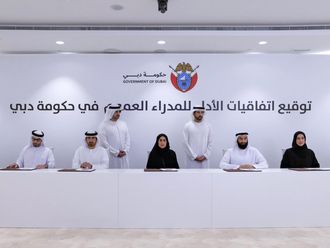Abu Dhabi: Academics participating in a major conference on political reforms here are divided over the role of foreign pressure and non-governmental organisations in pushing for real reforms in the Arab world.
Participants at the Emirates Centre for Strategic Studies and Research's annual conference were divided into three groups, one rejecting foreign pressure altogether, the other considering it crucial because non-governmental organisations (NGOs) in the Arab world were weak, while the third stream was open for dialogue with others.
Dr Amitav Acharya, deputy director and head of research at the Institute of Defence and Strategic Studies, Nanyang Technological University in Singapore, told Gulf News, foreign pressure would never bring change.
"Democracy and good governance ideas can never be enforced. They must be localised to meet the needs of societies," Acharya said.
He added insider proponents such as knowledge experts can persuade regimes that democracy and the rule of law will be for their benefit.
Professor Dawood Al Azdi, an academic in energy, ecology and hydrology, agreed that pressure will not work and Arabs should cooperate with the West rather than getting involved in conflict.
"Our success in democratisation lies in creating a forum for multilateral dialogue, which can create an atmosphere of mutual trust," he said.
Al Azdi suggested that Arabs should adapt India's democratic system to meet circumstances.
"They [the Indians] have their problems and they are addressing them and we too should address our problems in the same way. We can start from the beginning by uprooting corruption and adopting transparency."
Dr Marina Ottaway, Senior Associate, Carnegie Endowment for International Peace Washington, DC, believes that both state and non-state factors are crucial in change and that governments must be influenced from inside and outside to affect reforms. "Non-state actors including civil society and political society organisations should try to influence government from outside and inside respectively."
Dr Ottaway said the state was absolutely necessary and NGOs could not be a substitute.
Dr Doriya Sharaf Al Din, PhD Political Science, said those who want reforms should not wait for foreign pressure.
"They should rather launch them if they are determined and prepared. However, if these reforms are enforced by foreign parties we should not hastily reject them. We need real reforms, not matter brought by foreign pressure or insider proponents."
However, Dr Bourhan Ghalioun, director of the Paris-based centre for contemporary Oriental Studies at Sorbonne University, believes that pressure is crucial for reforms in the Arab world because civil society organisations are weak.
He said the pressure for reforms in the Arab world that came from the West following the September 11 attacks on the US had been aborted by Arab regimes because it was linked with unrealistic, unpopular and impure conditions that were not accepted by the Arab masses. He added that pressure should be exerted on Arab regimes from international bodies such as the United Nations.












